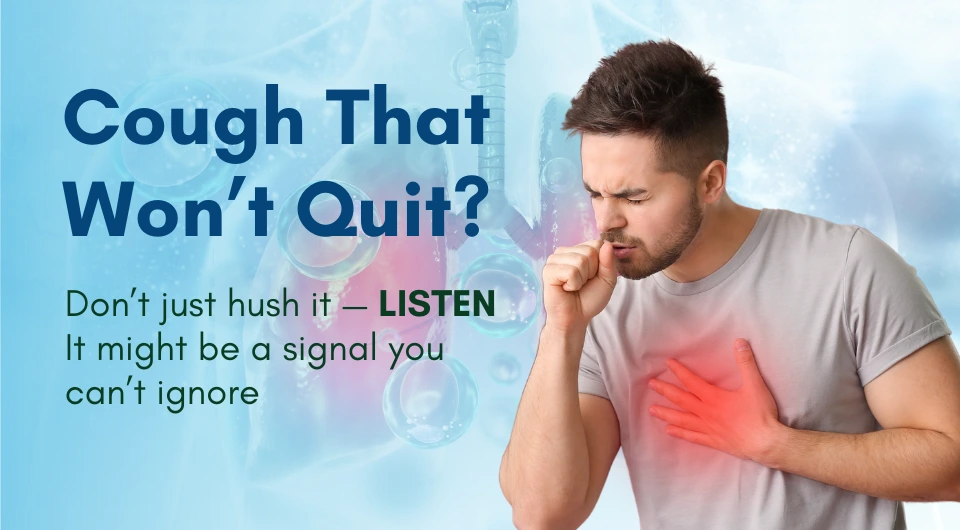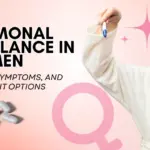Ahem ahem… sounds familiar, right? These little coughs seem so common these days. Unlike before, you now see people around you coughing like it is nothing. For older folks, a bit of coughing with age is expected. And sure, getting a cold or cough once in a while is normal; it even helps our immune system stay active. By now, you must already know what a cough is; it is that sound you make when something’s irritating your airways. But lately, it feels like everyone is coughing more than usual, doesn’t it?
While coughing in older adults may be common, due to environmental stressors or physiological responses, but frequent coughing in younger people is not normal. Should we just ignore it? Absolutely not. Because sometimes, that cough is trying to tell you something. These can be warning signs of lung disease. In this article, we aim to address some common cough-related issues and why they shouldn’t be overlooked.
Everyday Cough Troubles: What You Should Know
Coughing might seem like a small issue, but for many people, it comes with other uncomfortable symptoms. Some of the most common problems people face, along with a cough, include:
1. Chest Tightness and Cough
Chest tightness can feel like different things: a heavy weight on your chest, sharp pain, pressure, or a squeezing feeling. Sometimes it is nothing serious, like a pulled muscle or even anxiety. But it can also point to more serious issues. Two common ones are pneumonia and a collapsed lung.
A collapsed lung, also known as pneumothorax, occurs when air becomes trapped between the lung and the chest wall. This can happen on its own due to lung problems or after an injury. A spontaneous pneumothorax often occurs in young adults or people with pre-existing lung conditions like COPD or cystic lung disease. Along with chest pain, someone with a collapsed lung might also feel out of breath or have trouble breathing.
2. Trouble Breathing At Night
Do you, or someone you know, feel breathless after lying down? Does it become uncomfortable, as if you’re not getting enough air, no matter how deeply you breathe? If yes, don’t ignore it. Why? Because it might be more than just a minor issue you are brushing off.
It could be one of the symptoms of weak lungs. Let’s talk about one common issue: wheezing and shortness of breath, something many people deal with but often overlook.
Wheezing occurs when your breathing produces a high-pitched whistling sound, especially when exhaling. It usually means that your airways are constricted or blocked, making it difficult for air to move in and out. You may hear it most when exhaling, but it can also occur while inhaling.
Most of the time, wheezing originates from the smaller airways deep in the lungs. Wheezing is a high-pitched whistling sound made while breathing. It typically indicates narrowed or obstructed airways. However, it can sometimes be caused by blockages in the larger airways or issues with the vocal cords.
Moving on, let’s examine another common issue…
3. Shortness of Breath
This has many causes. Sometimes it is the lungs, other times it is heart-related, or even both. An underlying heart disease can cause breathlessness if your heart is unable to pump enough blood to supply oxygen to your body. If your brain, muscles, or other body organs do not get enough oxygen, a sense of breathlessness may occur.
It can also be a sign that your lungs might be struggling. The following are a few common reasons behind this:
- Blood clots in the lungs (pulmonary embolism)
- Swelling or mucus in the tiny airways (bronchiolitis)
- Chronic lung diseases like COPD, bronchitis, or emphysema
- Pneumonia
- High pressure in the lung arteries (pulmonary hypertension)
- Other lung conditions
There can also be problems with the airways leading to the lungs, like:
- Blocked nose, throat, or mouth
- Choking on something stuck in the airways
- Swelling near the vocal cords (like in croup, particularly in children)
- Inflammation of the flap that covers your windpipe (epiglottitis)
If you or someone you know is struggling to breathe when lying down, wheezing, or feeling air-hungry, take it seriously. Your lungs might be asking for help.
4. Uncontrollable coughing after COVID
We’ve all been through the COVID-19 pandemic. While that phase may be over, for some people, the after-effects, known as Long COVID, still linger.
One of the most common and stubborn signs? Uncontrollable coughing, even months after recovering. This isn’t just an annoying leftover symptom; it often means your lungs are still healing or having a tough time.
During the infection, COVID hits the lungs hard. It causes inflammation, and in some cases, scarring, fluid buildup, or stiff lung tissue. This makes it harder for your lungs to work properly, which leads to shortness of breath and a lingering cough.
In Long COVID, these issues don’t always clear up quickly. Many people continue to struggle with:
- Random or constant coughing
- Chest tightness
- Feeling breathless
These are the same issues we just talked about, right? But the real question is: what do most people do about them? Usually, many turn to home remedies, dry cough remedies. They grab a cough syrup or some over-the-counter medicine, without really knowing what’s causing the cough in the first place.
And that can be a problem, especially if the cough is a sign of something more serious.

Don’t Ignore the Signs – Here’s Why
The above symptoms might seem small, but they shouldn’t be taken lightly. Why? Because they could be one of the respiratory infection symptoms, or even something more serious. Sometimes, these symptoms could be signs of something more serious, like asthma or even lung cancer. That’s why early detection is so important, because with timely treatment and the proper guidance, one always has a chance to fight back.
Now, this doesn’t mean every cough or chest issue will turn into something major. But it is also true that many people with lung cancer have reported having these same early symptoms. Staying aware and acting early can make a big difference.
So, when should you see a doctor for a cough or shortness of breath?
- If you have sudden or worsening shortness of breath
- If you feel chest pain, especially when laughing, coughing, or moving
- If you notice blood or rust-colored mucus
- Or if your cough changes and doesn’t come with the usual signs of infection like fever or chills
These could be early warning signs, and acting early can make all the difference.
Concluding Thoughts
Coughing, chest tightness, or shortness of breath may seem minor, but they could be early warning signs of serious lung conditions. Whether it’s a lingering post-COVID cough, wheezing at night, or breathlessness while lying down, your lungs may be asking for help. Don’t rely solely on home remedies or delay seeking care. Early detection and timely medical attention can make all the difference. If symptoms persist or worsen, it’s best to consult a doctor and get the right diagnosis.
Disclaimer: This blog/content is for informational purposes only and should not be considered medical advice. Always consult a healthcare professional before starting any treatment. The content is not intended to diagnose, treat, cure, or prevent any condition.



